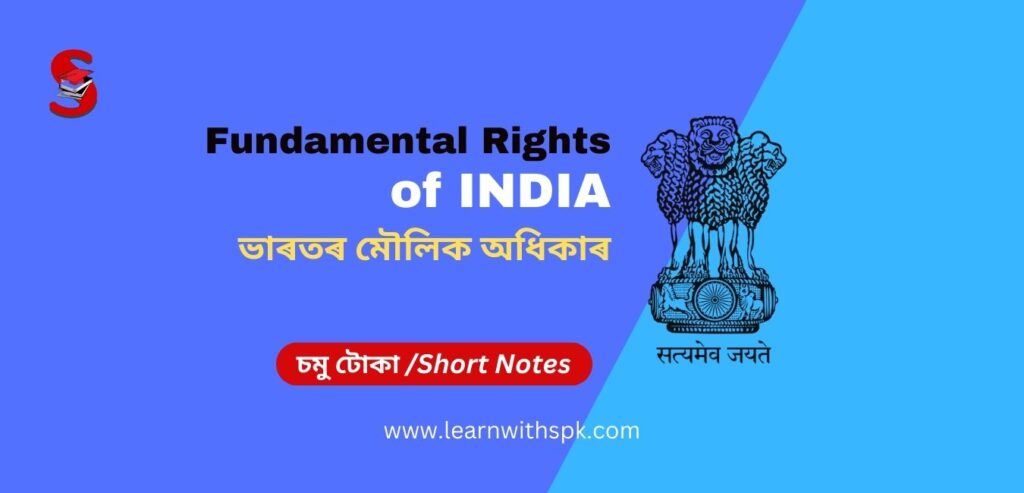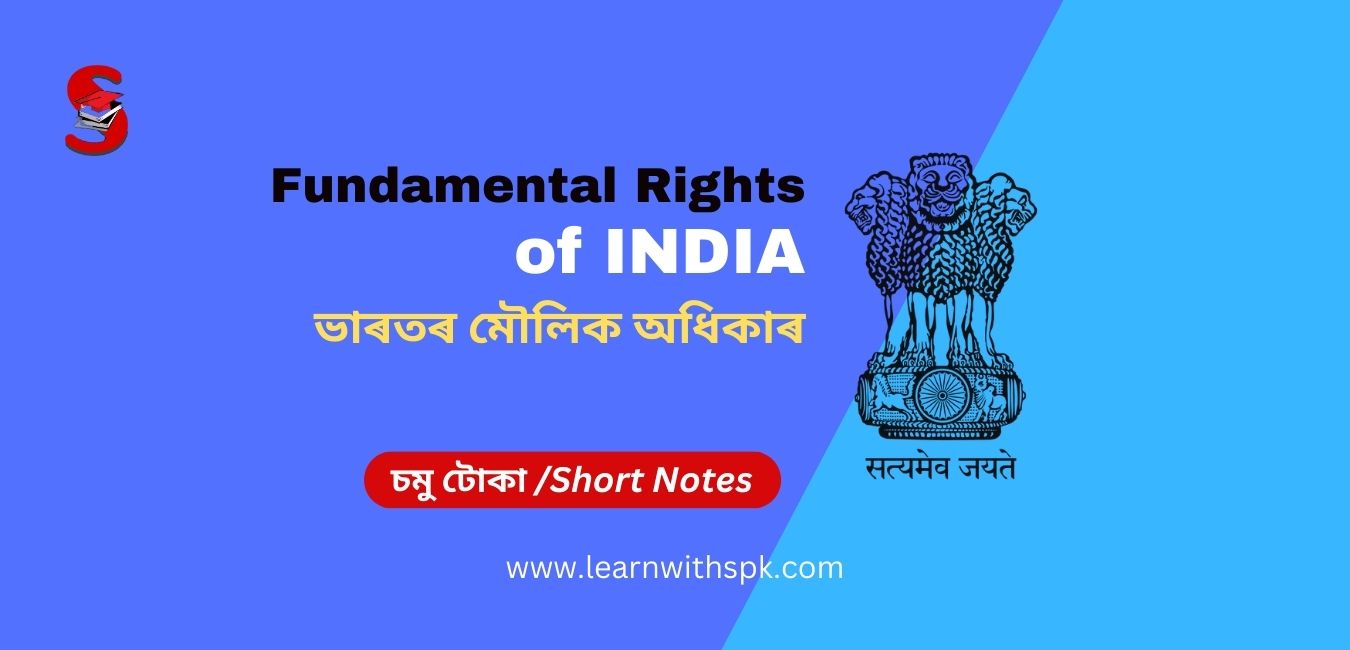In this article, we will discuss about the fundamental rights of India. We discuss in detailed on all six fundamental rights of India in Assamese and English language. This article will help you to know in detailed about the fundamental rights of Indian constitution. এই articleটোত আমি ভাৰতৰ মৌলিক অধিকাৰ সমূহৰ বিষয়ে আলোচনা কৰিম।

Fundamental Rights of India in Assamese | ভাৰতৰ মৌলিক অধিকাৰ সমূহ
Adopted on January 26, 1950, the Indian Constitution ensures every citizen’s fundamental rights, allowing for their correct and harmonious development in all facets of life. The Constitution’s Part III (Articles 12-35) guarantees these rights, which are necessary for advancement on all fronts—material, intellectual, moral, and spiritual. The fundamental rights of India are divided into six categories –
- Right to Equality
- Right to Freedom
- Right against Exploitation
- Right to Freedom of Religion
- Cultural and Educational Rights
- Right to Constitutional Remedies
All citizens are entitled to these rights, which are universal in nature, regardless of their gender, caste, religion, race, creed, or place of origin. They act as a guarantee that every Indian person will be able to live in peace and that their civil liberties would take precedence over all other local laws. This article will examine India’s fundamental rights, their importance, and the ways in which they have influenced the political and social climate of the nation.
Fundamental Rights of India – Part III of the Constitution from Articles 12 to 35
The Fundamental Rights of India are enshrined in Part III of the Constitution from Articles 12 to 35. মৌলিক অধিকাৰসমূহ সংবিধানৰ তৃতীয় খণ্ডত অনুচ্ছেদ ১২ৰ পৰা ৩৫লৈকে সন্নিবিষ্ট কৰা হৈছে।
In this regard, the framers of the Constitution derived inspiration from the Constitution of the USA (i.e., Bill of Rights). এই সন্দৰ্ভত সংবিধানৰ প্ৰণয়নকাৰীসকলে আমেৰিকাৰ সংবিধানৰ পৰা (অৰ্থাৎ অধিকাৰ বিল) প্ৰেৰণা লাভ কৰিছিল।
- Part III of the Constitution is rightly described as the Magna Carta of India. সংবিধানৰ তৃতীয় খণ্ডক ভাৰতৰ মেগনা কাৰ্টা বুলি সঠিকভাৱে বৰ্ণনা কৰা হৈছে।
- It contains a very long and comprehensive list of ‘justiciable’ Fundamental Rights. ইয়াত ‘ন্যায্য’ মৌলিক অধিকাৰৰ এক অতি দীঘলীয়া আৰু বিস্তৃত তালিকা আছে।
- In fact, the Fundamental Rights in our Constitution are more elaborate than those found in the Constitution of any other country in the world, including the USA. আচলতে আমাৰ সংবিধানত থকা মৌলিক অধিকাৰসমূহ আমেৰিকাকে ধৰি বিশ্বৰ আন যিকোনো দেশৰ সংবিধানত পোৱা অধিকাৰতকৈ অধিক বিশদ।
The Fundamental Rights of India are guaranteed by the Constitution to all persons without any discrimination. মৌলিক অধিকাৰ সংবিধানৰ দ্বাৰা কোনো ধৰণৰ বৈষম্য নোহোৱাকৈ সকলো ব্যক্তিৰ বাবে নিশ্চিত কৰা হৈছে।
Also Read: History of Indian Constitution (ভাৰতীয় সংবিধানৰ ইতিহাস)
Characteristics of Fundamental Rights of Indian Constitution: (ভাৰতীয় সংবিধানৰ মৌলিক অধিকাৰৰ বৈশিষ্ট্যসমূহঃ)
- বিস্তৃত আৰু সবিশেষ বর্ণনা (Detailed Description)
- ন্যায় বিচাৰযোগ্য (Justiciable) :
- অবাধ বা চৰম নহয (Not Absolute)
- সংশোধনৰ জটিলতা (Not Easily Amendable)
- আইনগত আৰু ৰাজনৈতিক প্ৰকৃতি (Legal and Political Nature)
- জৰুৰী অৱস্থাত খর্ব বা বাতিল (Suspension During Emergency) :
- নাগৰিক আৰু বিদেশীৰ বাবে মুকলি (Open for Citizens and Aliens)
- সম্পত্তিৰ অধিকাৰ বাতিল (Right to Property is withdrawn)
- কার্যপালিকা আৰু বিধানমণ্ডলৰ ক্ষমতা সীমিত (Restriction of Executive and Legislature ) :
- সংখ্যালঘুৰ স্বাৰ্থৰক্ষা কবচ (Safeguard for Minorities):
- শিশুসকলৰ শিক্ষা গ্ৰহণৰ অধিকাৰ (Right to Education of Children) :
- দেশত বা বিদেশত থকা নাগৰিকৰ বাবে মৌলিক অধিকাৰ (Fundamental Rights for those living in India or outside India)
- সামৰিক বাহিনীৰ ক্ষেত্ৰত মৌলিক অধিকাৰ (Fundamental Rights Regarding Armed Force) :
Originally, the Constitution provided for seven Fundamental Rights viz, মূলতঃ সংবিধানত এই ব্যৱস্থা আছিল সাতটা মৌলিক অধিকাৰ যেনে,
- Right to equality (Articles 14-18) সমতাৰ অধিকাৰ (অনুচ্ছেদ১৪-১৮)
- Right to freedom (Articles 19-22) স্বাধীনতাৰ অধিকাৰ (অনুচ্ছেদ ১৯-২২)
- Right against exploitation (Articles 23-24) শোষণৰ বিৰুদ্ধে অধিকাৰ (অনুচ্ছেদ ২৩-২৪)
- Right to freedom of religion (Articles 25-28) ধৰ্মৰ স্বাধীনতাৰ অধিকাৰ (অনুচ্ছেদ ২৫-২৮)
- Cultural and educational rights (Articles 29-30) সাংস্কৃতিক আৰু শৈক্ষিক অধিকাৰ (অনুচ্ছেদ ২৯-৩০)
- Right to property (Article 31) সম্পত্তিৰ অধিকাৰ (অনুচ্ছেদ ৩১)
- Right to constitutional remedies (Article 32) সাংবিধানিক প্ৰতিকাৰৰ অধিকাৰ (অনুচ্ছেদ ৩২)
However, the right to property was deleted from the list of Fundamental Rights by the 44th Amendment Act, 1978. কিন্তু ১৯৭৮ চনৰ ৪৪ সংখ্যক সংশোধনী আইনৰ দ্বাৰা মৌলিক অধিকাৰৰ তালিকাৰ পৰা সম্পত্তিৰ অধিকাৰ বাদ দিয়া হৈছিল।
It is made a legal right under Article 300-A in Part XII of the Constitution. So, at present, there are only six Fundamental Rights. সংবিধানৰ দ্বাদশ খণ্ডৰ ৩০০-ক অনুচ্ছেদৰ অধীনত ইয়াক আইনী অধিকাৰ হিচাপে গঢ়ি তোলা হৈছে। গতিকে বৰ্তমান সময়ত মাত্ৰ ছটা মৌলিক অধিকাৰ আছে।
Notes on Six Fundamental Rights of India | ভাৰতৰ মৌলিক অধিকাৰ সমূহ
Now, we will discuss all six fundamental rights of India one by one. We will be explaining it in both in Assamese and English Language. আমি এতিয়া ভাৰতৰ মৌলিক অধিকাৰ সমূহৰ বিষয়ে আলোচনা কৰিম।
1. Right to equality (Articles 14-18) সমতাৰ অধিকাৰ (অনুচ্ছেদ১৪-১৮) :
- Equality before law and equal protection of laws (Article 14). আইনৰ আগত সমতা আৰু আইনৰ সমান সুৰক্ষা (অনুচ্ছেদ ১৪)।
- Prohibition of discrimination on grounds of religion, race, caste, sex or place of birth (Article 15). ধৰ্ম, জাতি, জাতি, লিংগ বা জন্মস্থানৰ ভিত্তিত বৈষম্য নিষিদ্ধ কৰা (অনুচ্ছেদ ১৫)।
- Equality of opportunity in matters of public employment (Article 16). ৰাজহুৱা নিয়োগৰ বিষয়ত সুযোগৰ সমতা (অনুচ্ছেদ ১৬)।
- Abolition of untouchability and prohibition of its practice (Article 17). অস্পৃশ্যতা বিলুপ্ত কৰা আৰু ইয়াৰ অনুশীলন নিষিদ্ধ কৰা (অনুচ্ছেদ ১৭)।
- Abolition of titles except military and academic (Article 18) সামৰিক আৰু শৈক্ষিকৰ বাহিৰে উপাধি বিলুপ্ত কৰা (অনুচ্ছেদ ১৮)
2. Right to freedom (Articles 19-22) স্বাধীনতাৰ অধিকাৰ (অনুচ্ছেদ ১৯-২২):
(Article 19). পেছা (ধাৰা ১৯):
(a) Protection of six rights regarding freedom of: স্বাধীনতাৰ সম্পৰ্কে ছটা অধিকাৰৰ সুৰক্ষা
- speech and expression, বাক্য আৰু প্ৰকাশ
- assembly, সমাবেশ,
- association, সংঘ,
- movement, গতি,
- residence, and বাসস্থান, আৰু
- profession
(b) Protection in respect of conviction for offences (Article 20). (খ) অপৰাধৰ বাবে দোষী সাব্যস্ত হোৱাৰ ক্ষেত্ৰত সুৰক্ষা (অনুচ্ছেদ ২০)।
(c) Protection of life and personal liberty (Article 21). জীৱন আৰু ব্যক্তিগত স্বাধীনতাৰ সুৰক্ষা (অনুচ্ছেদ ২১)।
(d) Right to elementary education (Article 21A). প্ৰাথমিক শিক্ষাৰ অধিকাৰ (অনুচ্ছেদ ২১ক)।
(e) Protection against arrest and detention in certain cases (Article 22). কিছুমান বিশেষ ক্ষেত্ৰত গ্ৰেপ্তাৰ আৰু আটক কৰাৰ পৰা সুৰক্ষা (অনুচ্ছেদ ২২)।
3. Right against exploitation (Articles 23-24) শোষণৰ বিৰুদ্ধে অধিকাৰ (অনুচ্ছেদ ২৩-২৪)
(a) Prohibition of traffic in human beings and forced labour (Article 23). মানুহৰ সৰবৰাহ আৰু বলপূৰ্বক শ্ৰম নিষিদ্ধ কৰা (ধাৰা ২৩)।
(b) Prohibition of employment of children in factories, etc. (Article 24). কাৰখানা আদিত শিশুক নিয়োগ কৰাত নিষেধাজ্ঞা (ধাৰা ২৪)।
4. Right to freedom of religion (Articles 25-28) ধৰ্মৰ স্বাধীনতাৰ অধিকাৰ (অনুচ্ছেদ ২৫-২৮)
(a) Freedom of conscience and free profession, practice and propagation of religion (Article 25). বিবেকৰ স্বাধীনতা আৰু মুক্ত বৃত্তি, ধৰ্মৰ চৰ্চা আৰু প্ৰচাৰ (অনুচ্ছেদ ২৫)।
(b) Freedom to manage religious affairs (Article 26). ধৰ্মীয় কাম-কাজ পৰিচালনাৰ স্বাধীনতা (অনুচ্ছেদ ২৬)।
(c) Freedom from payment of taxes for promotion of any religion (Article 27). যিকোনো ধৰ্মৰ প্ৰচাৰৰ বাবে কৰ আদায়ৰ পৰা মুক্তি (অনুচ্ছেদ ২৭)।
(d) Freedom from attending religious instruction or worship in certain educational institutions (Article 28) কিছুমান শিক্ষানুষ্ঠানত ধৰ্মীয় শিক্ষা বা উপাসনাত অংশগ্ৰহণৰ পৰা স্বাধীনতা (অনুচ্ছেদ ২৮)
5. Cultural and educational rights (Articles 29-30) সাংস্কৃতিক আৰু শৈক্ষিক অধিকাৰ (অনুচ্ছেদ ২৯-৩০)
- Protection of language, script and culture of minorities (Article 29). সংখ্যালঘুৰ ভাষা, লিপি আৰু সংস্কৃতিৰ সুৰক্ষা (অনুচ্ছেদ ২৯)।
- (b) Right of minorities to establish and administer educational institutions (Article 30) সংখ্যালঘুসকলৰ শিক্ষানুষ্ঠান স্থাপন আৰু পৰিচালনাৰ অধিকাৰ (অনুচ্ছেদ ৩০)
6. Right to constitutional remedies (Article 32) সাংবিধানিক প্ৰতিকাৰৰ অধিকাৰ (অনুচ্ছেদ ৩২)
Right to move the Supreme Court for the enforcement of fundamental rights including the writs of ৰিটকে ধৰি মৌলিক অধিকাৰ বলবৎ কৰাৰ বাবে উচ্চতম ন্যায়ালয়ত প্ৰস্তাৱ দিয়াৰ অধিকাৰ
- habeas corpus, বন্দী প্রত্যক্ষীকৰণ
- mandamus, পৰমাদেশ
- prohibition, নিষেধাজ্ঞা,
- certiorari, and অধিকাৰ পৃচ্ছা কৈফিয়ৎ তলবী আৰু
- quo war-rento উৎপ্রেষণ
